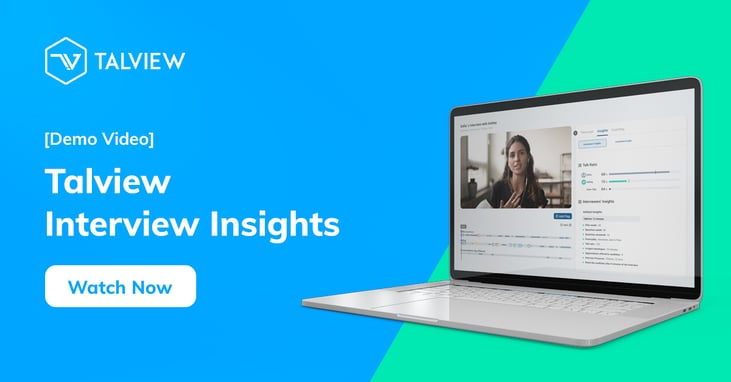Recruiting the right candidate is an essential element of any business, and interviews are a vital part of this process.
In the month of June, there were there 10.7 million new job openings in the U.S., roughly 1.8 open jobs for every person who is unemployed, and yet recruiters and talent acquisition professionals face hurdles like never before.
Could the interview process be part of the problem?
What Is the Purpose of a Candidate Interview?On average, each vacant position in an organization gets at least 250 resumes. While resume parsing software can help weed out unfit applicants, how can a recruiter select the best fit among the 4-6 resumes that fit the bill? That's where interviews come into play.
Interviews help identify whether a candidate is a good fit for the position in question and whether they have the technical skills, communication skills, and abilities required (beyond the resume and job description) to do the job efficiently. Interviews are also an excellent way to gauge a candidate's work experience. Learning what skills and experience candidates have can help determine if they might require additional training after being hired.
Interviews can help assess if the candidate is the right fit culturally. Interviews are a great way to show qualified candidates how your organization works and determine their possible fit into your company culture. Research indicates the interview experience is also a crucial factor influencing a candidate's decision whether to join an organization.
What’s Wrong with the Current Interview Process?
Have you ever felt the candidate you really liked and hired for a position is constantly underperforming? Or did someone with a great resume turn out to be drastically different than you expected? This can be the direct result of a poor interview process.
While going with the gut feeling might have been an accepted way to hire candidates years ago, it not only fails to scale to meet today’s enterprise needs, but it is also utterly foolish in today's labor climate. Interviewing is a skill we assume we know well because we have been doing it for so long. A deliberate effort to analyze today's interviewing techniques can yield interesting results.
Often, interviewers select candidates because they like them instead of looking at their competency, behavior, attitude, and ability to learn. This is what we call bias. Interview bias, unfortunately, is more prevalent than you think. Many times, this is unconscious, i.e., you don't even know you are being biased towards a candidate. It could be because you're from the same place, enjoy the same kind of music, or any of a number of factors.
Talent Acquisition is a Numbers Game
Imagine having to sort through tons of resumes, selecting a choice few, scheduling interviews, sending reminders, and interviewing job candidates one after the other. This routine can easily result in fatigue. Fatigue can lead to interviewers failing to ask the right questions or overlooking red flags, which can lead to a bad hire. Bad hires are extremely expensive in a multitude of ways – the dollar cost, losses in productivity, negative impacts on team morale – to name just a few.
Another often disregarded but vital part of the hiring process is feedback collection. No, we are not talking about the interviewer's feedback about the candidate; that is common. Feedback is provided to candidates to help them understand why/why not they have been selected and how they can get better.
But don’t stop with the candidate. What about feedback for the interviewer: Did they ask the right kind of questions, did the candidate feel comfortable, did the interviewer engage well, did they represent the organization in a positive light, and so on.
In a recent article on Forbes, Sanjoe Tom Jose discusses the interview process today and shares some valuable insights.
How Can the Interview Process Be More Effective, Fair, and Accurate?
The first step to ensuring an effective interview process is understanding what the interview is for. As simple as that sounds, recruiters and hiring managers often overlook the interview's entire purpose, leading to a poor experience for themselves and the candidates.
For example, knowing the intricacies of the different roles you are interviewing for is critical. If you ask only functional questions to someone in a technical role, it can badly impact the quality of your hire. The more interviewers understand what they're looking for and how the hire fits into the larger picture, the more effective they can be.
This brings us to an essential question: What information should be gathered in a quality interview?
Gathering Relevant Information by Asking the Right Questions
An effective candidate interview should give the interviewer enough information to gauge the candidate's fit for the organization. While getting the basics about their skills and qualification is a given, interviews also pave the way for the interviewer to understand a candidate's behavior. For example, a question about the candidate's mistakes in the previous role can help assess their honesty and learnability.
Questions about relationships with previous colleagues or leadership can help determine how a candidate navigates through and resolves problems with people. Another hidden benefit of gathering this information is seeing the candidate's maturity level and understanding how they communicate.
Also read: 5 Methods of Assessing General Cognitive Ability in Candidates
Developing a Robust Interviewer Training Program
Many managers know how to build a rapport with the candidates they interview. However, once you leave the ranks of recruiting and talent acquisition professionals, few interviewers are adept at identifying potential bias, conducting structured interviews, or assessing a candidate's true behavior and potential. This is where interviewer training comes in handy.
Training interviewers on how to communicate with potential candidates, what kind of questions to ask, what to avoid, etc., can drastically improve the quality of hire. When planning to train the interviewers, consider the following:
- Do the interviewers know how to present your organization to candidates?
- Is the interviewer adept at making candidates feel comfortable?
- Is the interviewer good at providing accurate feedback?
Once you know what the interviewer lacks, you can focus on providing them with specialized training to excel at interviewing. But training shouldn't just happen before an interview, it should be continuous. What truly matters is understanding and analyzing how the interviewer performs with candidates and providing constructive feedback for improvement.
Creating a Holistic Interview Framework
The current interview process needs to change for the better. A holistic interview framework that covers the dos and don'ts of the process helps structure the interview and breaks down complexities. Frameworks can help avoid unconscious bias, promoting diversity and inclusion. Here are a few components that can be embedded into an interview framework:
- Conversation Starters: How the interview starts can hugely impact how a candidate behaves for the rest of the interview. While going directly to the point is good, engaging in small talk to gauge a candidate's behavior is a great idea.
- Putting Candidates at Ease: Interviews can be nerve-wracking for candidates. A relaxed interviewee will express themselves with authenticity and confidence. Ensure the interviewer understands this and shows empathy towards the interviewees. Interviewers can do it by listening intently, maintaining eye contact, giving them hints when they seem stuck, etc.
- Interview Questions: Knowing what questions to ask for each role can help standardize the entire interview process. Having a standardized interview can ensure a fair and replicable interview process.
- Keep the Conversation on Topic: Often, the conversation can go off-topic unintentionally. This can lead to a waste of time for both the candidate and the recruiter/hiring manager. While it is vital to connect with the candidate personally, ensure you don't stray off topic.
- Engage with Candidates for Better Understanding: While going off-topic is ill-advised, engaging with the candidate and understanding them better is imperative. This is especially true in today's post-pandemic world, where remote hiring and remote working is a norm.
HR Executive Technology Conference & Exposition
Talview will be discussing the art of the Interview at the HR Technology Conference & Exposition, the industry’s leading independent event for HR and IT professionals from businesses of all sizes, all industries and across the globe.
Join us for our session, Build Exponentially Better Teams Through Best-in-Class Interviewing, Thursday, September 15, at 3pm in the Study Theatre. It will be presented by Sanjoe Tom Jose, Founder & CEO of Talview, and Dr. Fred Rafilson, Chief I/O Psychologist at Talview.
Schedule a Meeting with us to reserve time for a personal demo of our latest Solution or to discuss your organization's specific needs. We hope to see you at the Conference.








Leave a Reply